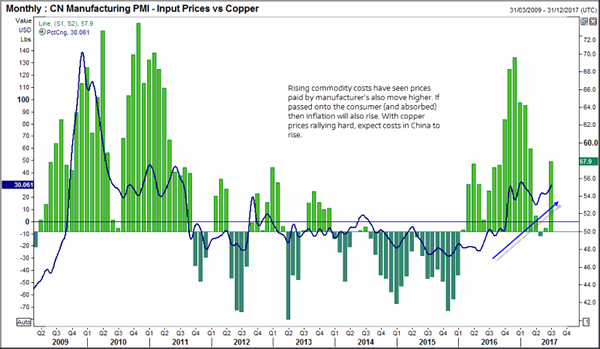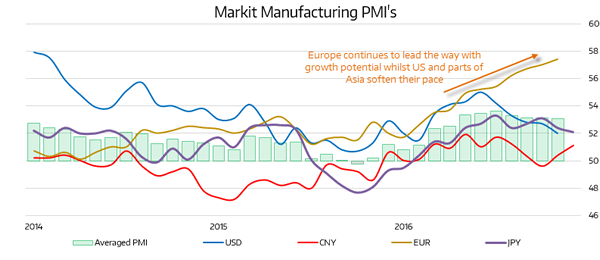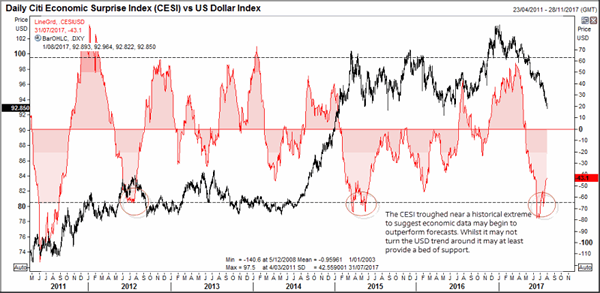It is the start of a new month, which means we’ll now see a host of soft business surveys for the globe which provide a preview of growth potential further into the year.
Manufacturing PMI expanded for a 10th straight month in July and sots at a 3-month high of 56. The 1yr average trend continues to point higher although this month it has flattened off at 54.2. This is the 5th month above the 1yr average to show continued support for growth from the sector. New orders declined -3.7pts on the month and sits at a 6-month low of 558.8. The 1yr average is 57.2. which suggests potential headwinds ahead later in the year of orders do not pick up pace.
Input prices rose to a 3-month high of 69.3 and tracks the Melbourne monthly CPI higher (currently 2.7% annually). Average wages declined for a 2nd consecutive month which brings the index down to 55.7 from 60.4, placing it firmly below the 1yr average at 58.3.

Chinas manufacturing PMI’s have picked up slightly, although the story of two tales continues between the NBS and manufacturing read. NBS (National Bureau of Statistics) is government related and uses a smaller ample size of the largest companies, which often provides a rosier outlook for China when compared with the Markit PMI. The latter, which is privately run company, also includes small to medium sized companies and uses a larger sample size. Therefore, when we compare PMI’s we use Markit data to keep a consistency among the countries involved.
Still, the NBS reads has its use as the internal reads do provide a look inflationary forces. Input costs have risen sharply due to higher commodities but an important commodity to follow for China and global growth and inflation is copper.

Apart from Europe, the developed world seems to be falling behind with their rate of manufacturing PMI expansions. Whilst China’s manufacturing PMI has recovered after a blip below 50 the rate of expansion remains sanguine. Japan’s PMI continues to expand but at 52 and pointing gently lower, it hardly sets the world alight. And US Markit PMI provides a similar tale, only this time the top is more prominent in Q1 and has since pointed steadily lower. This is an important point because PMI data tends to lead GDP growth by 6-12 months, so if it has softened since the end of Q1, it paints a weak growth story around end of Q3 to early 2018. We have taken the average of all four which suggests it topped in May, which in turn means global growth is likely to stutter in Q4 – Q2 ’18. ISM PMI data is out tonight and this has painted a better picture for the US but for a fairer comparison, we used Markit PMIs for consistency.

Whilst the USD breaks support levels with ease, we wonder if it is now approaching a sentiment extreme and in need of a reprieve. A clue may be within the CESI (City Economic Surprise index). We highlighted in June how the CESI had moved to levels usually associated with a turnaround. The further negative the index sits the worse economic data performs in relation to consensus. It has now bounced back within -1.5 standard deviation to show it isn’t underperforming as badly as it once and may try to move higher form here. The correlation between the index and the US Dollar is not a simple or even that reliable over the longer-term. Yet we can use it to assess sentiment and urge caution from being too bearish on USD now as it sits above key support (2016 low) and every man and his dog is now short the USD.
